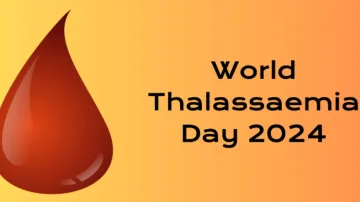Every year on May 8th, the world celebrates World Thalassaemia Day to raise awareness about this inherited blood disorder. Thalassaemia is a genetic condition in which the body produces an abnormal form of haemoglobin, leading to the destruction of red blood cells and causing anaemia. It is a serious and life-long condition that requires constant medical care and can significantly impact the quality of life.
On this World Thalassaemia Day 2024, let us shed light on one crucial step that can prevent the transmission of this disorder to future generations – undergoing a blood test before marriage. While love may be blind, it is essential to open our eyes and educate ourselves about the importance of a premarital blood test.
Here are some compelling reasons why every couple must undergo a blood test before tying the knot:
- Undergoing a blood test before marriage can help identify if either or both partners are carriers of the thalassaemia gene.
- By undergoing a blood test before marriage, couples can take necessary precautions to prevent passing on this disorder to their future children.
- A blood test before marriage not only helps identify the risk of thalassaemia but also other genetic disorders that can be passed on to children.
- If one partner is a thalassaemia carrier, it does not necessarily mean that their child will inherit the disorder. However, by undergoing a blood test before marriage, couples can be aware of the risk and take necessary precautions to enable early detection and treatment if needed.
- Many individuals are hesitant to undergo blood tests due to the stigma associated with it. However, it is crucial to understand that it is simply a preventive measure to ensure a healthy future for both partners and their potential children.
When we asked Dr Gaurav Kharya, Clinical Lead at Centre of Marrow Transplant and Cellular Therapy, and Senior Consultant at Paediatric Haematology, Oncology and Immunology, Indraprastha Apollo Hospitals, about the importance of blood tests before marriage, he said," I believe undergoing a blood test before marriage is a crucial step for every couple. This simple yet invaluable screening process can provide vital information about an individual's health, ultimately contributing to a healthier and more informed decision-making process. Certain genetic disorders, such as sickle cell disease, thalassemia, and haemophilia, can be passed down from one generation to the next."
"By performing a blood test, we can detect the presence of these disorders or identify carriers. Blood tests can also reveal the presence of various blood-borne infections, including HIV, hepatitis B, and hepatitis C. Early detection of these conditions is crucial for prompt treatment and preventing transmission to the partner or future offspring" he added.
Concerning Thalassemia, which is an inherited blood disorder that affects the production of haemoglobin. It is important to note that when both partners are carriers of the thalassemia gene, there is a 25% chance that their child will inherit the disease in its most severe form. This condition requires lifelong blood transfusions and iron chelation therapy, placing a significant burden on the affected individuals, their families, and the healthcare system. In cases of Thalassemia blood test before marriage, couples can determine their thalassemia carrier status. If both partners are identified as carriers, they can make informed decisions about their future family planning. This may involve seeking genetic counselling, exploring options such as preimplantation genetic diagnosis (PGD) or considering alternative paths to parenthood, such as adoption or using donor gametes.
ALSO READ: World Thalassaemia Day 2024: 5 natural ways to increase your haemoglobin count
